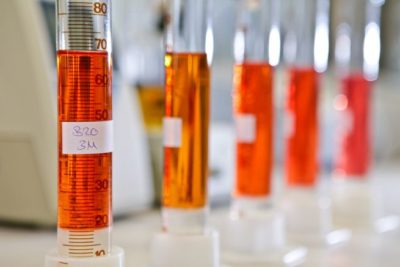Research for the energy transition

Fuel samples under test. Photo: OWI
29 November 2018 – The OWI Oel-Waerme-Institut celebrates its 20th birthday this autumn. The non-profit research institute was founded in Aachen in 1998 and has been an affiliated institute of RWTH Aachen University since 2007. After its foundation, the OWI experienced a rapid growth with an expansion of its research topics and can look back on the successful implementation of numerous important research projects.
For example by its dedicated research activities OWI supported the market introduction of low-sulfur heating oil. Also the introduction of bio fuel oil on the market was and is still scientifically key topic of interest. In recent years, the focus of the national and international funding agencies has led to a reorientation of the research activities towards the challenges of climate protection and energy transition. Today, OWI investigates and is working together with partners on technically mature solutions for tomorrow in the area of climate- and environmentally friendly heat and energy generation and mobility. In order to advance these research activities OWI is actively participating in large research clusters. In order to successfully implement the energy transition, the aim is to make liquid fuels based on renewable sources of energy particularly efficient with low-emissions and safe to use.
OWI focusses on two central research fields: sustainable liquid energy sources and efficiency technologies. “For example, we are investigating the use of fuels from waste and residues of biogenic origin,” explains OWI Managing Director David Diarra. “E-fuels or synfuels, which are synthetically produced from renewable electricity and a renewable carbon source, are also a hot topic for us. In 2016, OWI established the “Future Fuels” research cluster to focus on the growing need for research and development in connection with sustainable liquid energy sources. This research cluster includes projects relating to research into new fuels and the development of efficiency technologies for their use.
Innovative efficiency technologies such as fuel cells, hybrid heating systems and cogeneration are important research topics in the field of energy systems. Here the efficient use of fuels and combustibles is at stake. “One highlight was the nomination for the Energy Award 2017 with the research project Ship Fuel Cells. Here, OWI is working together with research partners from the marine shipbuilding industry on the efficient generation of on-board power, specifically for low-emission port operation, for example of cruise ships and container ships,” reports David Diarra.
The scientific know-how available at OWI in the fields of fuels and lubricants, energy system technology, high-temperature technology, materials science and numerical simulations is unique in Europe in this combination. “With a highly qualified workforce and an outstanding network of research partners in industry, universities and research institutions, we are well prepared for the coming years of successful research,” explains David Diarra.





